CHOOSE WISELY!
Chinese Herbs Common Uses & How To Source

Herbal therapy has been used for centuries in Asia, where the practice of incorporating the right herbs into food and drink is considered fundamental therapy for many chronic and acute conditions. With hundreds of herbs used regularly, the possibilities are infinite, especially as a TCM expert or herbologist will likely give you a concoction specific to you. With that being said, there are a few tried and true listed below.
Common Ailments & Associated Herbs
Low Energy
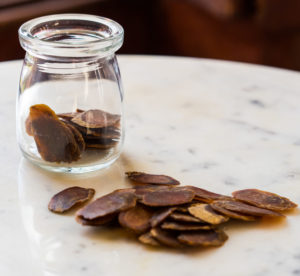
Panax Ginseng – Panax ginseng is a powerful anti-inflammatory and immunomodulatory supplement. As a result, taking a regular ginseng supplement can help diminish symptoms of depression, anxiety, general fatigue, insomnia, dizziness and headaches, and menopause.
High Blood Pressure
Tianma has long been used in Traditional Chinese Medicine for treating those with hypertension and recent research shows that it can reduce BPV, control BP and improve clinical symptoms both in vitro and in vivo. If you suffer from high blood pressure, get other diet and acupuncture tips to help here.
Menstrual Symptoms and Regulating Cycles
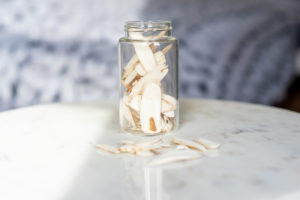 White peony has a long history of use for treating period cramps (and can be especially effective when used in combination with Dong Quai), making peony decoctions one of the more useful at-home remedies for dysmenorrhea.
White peony has a long history of use for treating period cramps (and can be especially effective when used in combination with Dong Quai), making peony decoctions one of the more useful at-home remedies for dysmenorrhea.
Cold/flu Symptoms
Cinnamon – many people wouldn’t know that this common spice is actually a Chinese herb that is healthy! As an antioxidant and an anti-inflammatory, it is commonly used to treat colds and other viral upper respiratory infections. Whether in your tea, your cereal or on your toast, there are so many ways to get your dose of cinnamon.
Blood Circulation
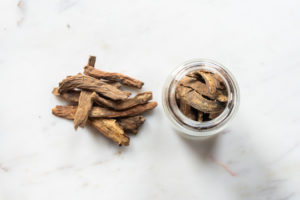 Red sage root aka danshen is said to be adaptogenic, alterative, anticholesterolemic, antihypertensive, antirheumatic, antiseptic, antispasmodic, astringent, emmenagogic, hepatoprotective, sedative, tonic, vulnerary, and much more.More or less, that means the dried red roots of danshen plants may reduce bodily inflammation, increase circulation and decrease blood pressure.
Red sage root aka danshen is said to be adaptogenic, alterative, anticholesterolemic, antihypertensive, antirheumatic, antiseptic, antispasmodic, astringent, emmenagogic, hepatoprotective, sedative, tonic, vulnerary, and much more.More or less, that means the dried red roots of danshen plants may reduce bodily inflammation, increase circulation and decrease blood pressure.
Digestion Issues
Red Yeast Rice – most widely used in Chinese medicine to treat digestive and circulatory disorders, studies have shown it also contains elements that may reduce cholesterol levels. For other specific recommendations on gut health, check out this blog.
Back Pain
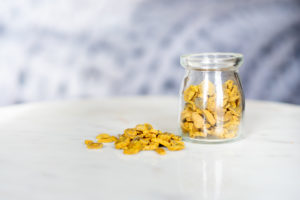 Corydalis – Corydalis supplements have empirically-proven analgesic and sedative effects. Corydalis root decoctions get their sedative and pain-killing properties by inhibiting dopamine receptors and triggering changes in serotonin and noradrenaline levels — similar to the ways modern SSRI antidepressants function. For ideas on how acupuncture, diet and other TCM-approved tactics, read “Pain Management With TCM”.
Corydalis – Corydalis supplements have empirically-proven analgesic and sedative effects. Corydalis root decoctions get their sedative and pain-killing properties by inhibiting dopamine receptors and triggering changes in serotonin and noradrenaline levels — similar to the ways modern SSRI antidepressants function. For ideas on how acupuncture, diet and other TCM-approved tactics, read “Pain Management With TCM”.
Sleep Issues
Xiao yao wan – may lead to improvements with falling and staying asleep by inspiring users to feel relaxed, while gui pi wan can help if you find that you’ve got low energy and are tired, but still unable to sleep. You can find other TCM-inspired tips to help you sleep here.
Depression
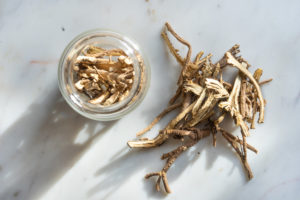 Bupleurum – the benefits of regular supplementation result in quality-of-life improvements, like getting relief from hemorrhoids, indigestion, constipation, and a number of stress-induced conditions like headache, tinnitus, angina (chest pain), anorexia, and insomnia. For additional natural tips on how to help with depression, read more in “Beat The Bad Mood”.
Bupleurum – the benefits of regular supplementation result in quality-of-life improvements, like getting relief from hemorrhoids, indigestion, constipation, and a number of stress-induced conditions like headache, tinnitus, angina (chest pain), anorexia, and insomnia. For additional natural tips on how to help with depression, read more in “Beat The Bad Mood”.
How to Choose Your Herbs Wisely
While the benefits of herb usage are well documented, some have been apprehensive to use them due to recent negative press. There have been some news reports about ‘bad’ Chinese herbs and supplements, where some foreign companies have been selling herbal product contaminated with toxic compounds, heavy metals, pesticides and microorganisms.
As with any purchase you make, who you purchase it from is important! Try to avoid Chinese herb supplements that have been manufactured overseas, and before you buy, do some preliminary research on the brand to see if there have been any issues with quality. Of most benefit is to read the label for a seal of approval from a third-party quality testing organization, such as U.S. Pharmacopeia, ConsumerLab or NSF International. Your health care provider is another person to speak with, as they can offer the best options for you.
Herbal therapies can even aid in the body’s recovery following cancer treatment, such as chemotherapy and radiation. Indeed, Chinese herbal medicines can be used to aid in recovering from many chronic diseases. Perhaps if you have exhausted all traditional Western therapies to no avail; turning to the herbal side of TCM may help. In addition, Chinese herbs can often help to counteract side effects of prescription medications.
If you have brands you love and trust, please do share that info below!
Newer
Eastern Medicine Tips For Women In Their 30's
Older
4 Must-Have Products to Help You Cultivate Mindfulness
Comments (0)
Leave a reply
You must be logged in to post a comment.




